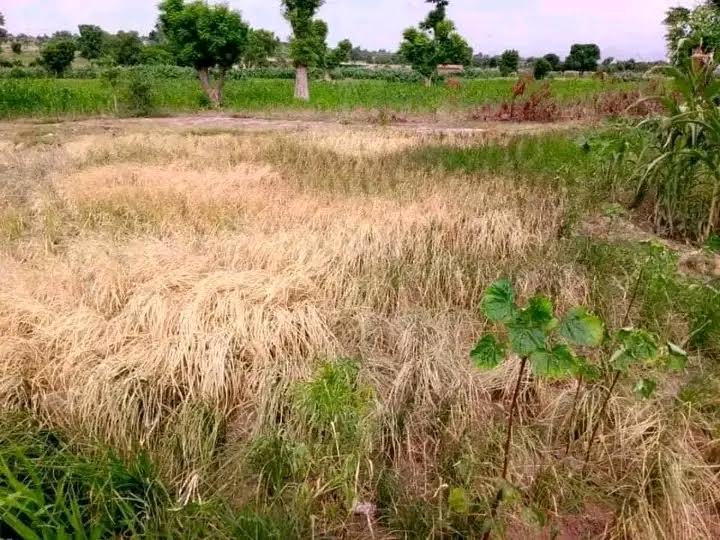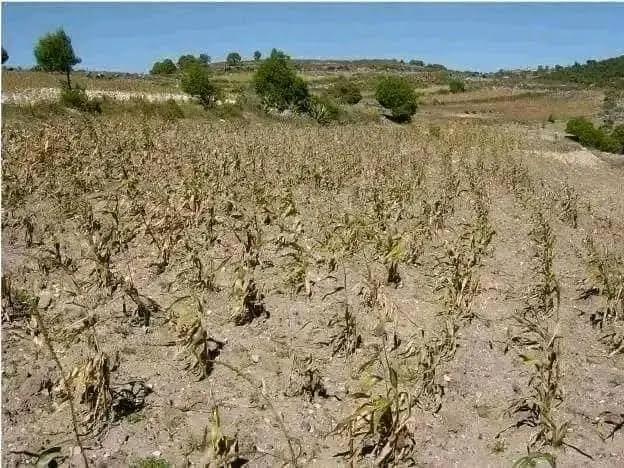Niger State, one of Nigeria’s largest agricultural producers with 2.3 million hectares of viable farmland, is facing an unprecedented drought that began over a month ago.
Despite being in the middle of the rainy season, Niger state has seen a drastic reduction in rainfall, leaving lands parched and crops failing.
The situation has severely impacted various agricultural sectors, with crop cultivation suffering the most.
Farmers across Niger state, particularly in Shiroro Local Government, are deeply concerned.
A local farmer, Nasiru Abbas, expressed his worries, stating, “This drought is beyond our imagination. Our crops are being destroyed, and I’m afraid the rain won’t come in time to save them.”
The drought has hit essential crops like maize, rice, soybean, tomato, and wheat the hardest, while drought-resistant crops such as millet, groundnut, cassava, and sorghum may still have a chance if rainfall resumes soon.
In Munya Local Government, another farmer, Muhammad Aliyu, described the situation as the worst threat they’ve ever faced, with some communities going over a month without significant rainfall.

“This has never happened before. The situation has really left us debased.
“The neighboring communities like Daza and Tindi has been hit the worse hit over a month without rainfall,” Mr. Aliyu said.
Local officials confirm the severity of the drought.
The Zonal Officer of the Niger State Agriculture and Mechanization Development Authority (NAMDA) in Shiroro, Muhammad Katarma,
reported a drastic reduction in crop yields, warning that this will significantly affect the expected harvest.
“We’ve seen a drastic reduction in crop yields, farmers are reporting losses of crops to drought in high volume. This will indeed affect bumber harvest,” Katarma said.
Causes and Consequences
Climate experts attribute the ongoing drought to shifting climate patterns affecting the region, a trend linked to global climate change.
They warn that this drought is not an isolated event but part of larger environmental changes impacting Nigeria’s agricultural heartland.
The Food and Agriculture Organisation (FAO) 2023 report predicts increased food insecurity in Nigeria due to factors like climate change, conflict, and economic instability.
With the current drought, local communities are already experiencing a rise in food prices, exacerbating economic hardships.
A local consumer, Sani Yau, lamented the skyrocketing prices of maize, a staple food.
“Newly cultivated maize used to be affordable, but now it’s sold at N1,200. This drought has destroyed so many crops, especially maize, leading to low supply and high prices.
“This comes through many factors, but it is obvious, the heart touching one is this drought, it has destroyed so many crops especially the maize and now the supply in the market is very low, affecting the prices. Remember,this is just the first quarter of the harvest,” Yau said.
Government, Communities Response
The market chief of Kuta, Haruna Pada, warned that the supply of food items, particularly non-drought-resistant crops, would drastically decrease.
He emphasized that communities near rivers might mitigate the drought’s impact through irrigation farming.
“As the only thing that can be cultivated from farm now is guinea corn and yam, the scarcity of other farm produce in the near future can be unwillingly confirmed.”
The Permanent Secretary of the Ministry of Agriculture in Niger State, Dr. Matthew Ahmed, urged farmers to adopt drought-resistant crops and improved seedlings.
He advised farmers to plant Tella Maize once the rains return and highlighted the government’s plans to support dry-season farming through partnerships with development organizations.
“We wish to encourage the farmers in the State to plant Tella Maize as soon as the rains are back, they can plant up to the first week of September.
“We must continue to enlighten our Farmers that improved seedlings and crops that are drought resistant have huge advantages over the traditional varieties. These new and improved varieties are available for our farmers at designated market locations,” he said.
“Our Development partners: FADAMA N-CARES; IFAD Value Chain Development Programme (VCDP-AF); ATASP 1 and ACReSAL will be supporting dry season activities across the States,” he added.
Hope for Relief
The Nigerian Meteorological Agency (NiMet) forecasts that the “Little Dry Season” (LDS), which began on July 22, will last until August 18, with rains expected to continue until November.
NiMet advises farmers to plan for a second cropping cycle later this month to maximize their harvests.


